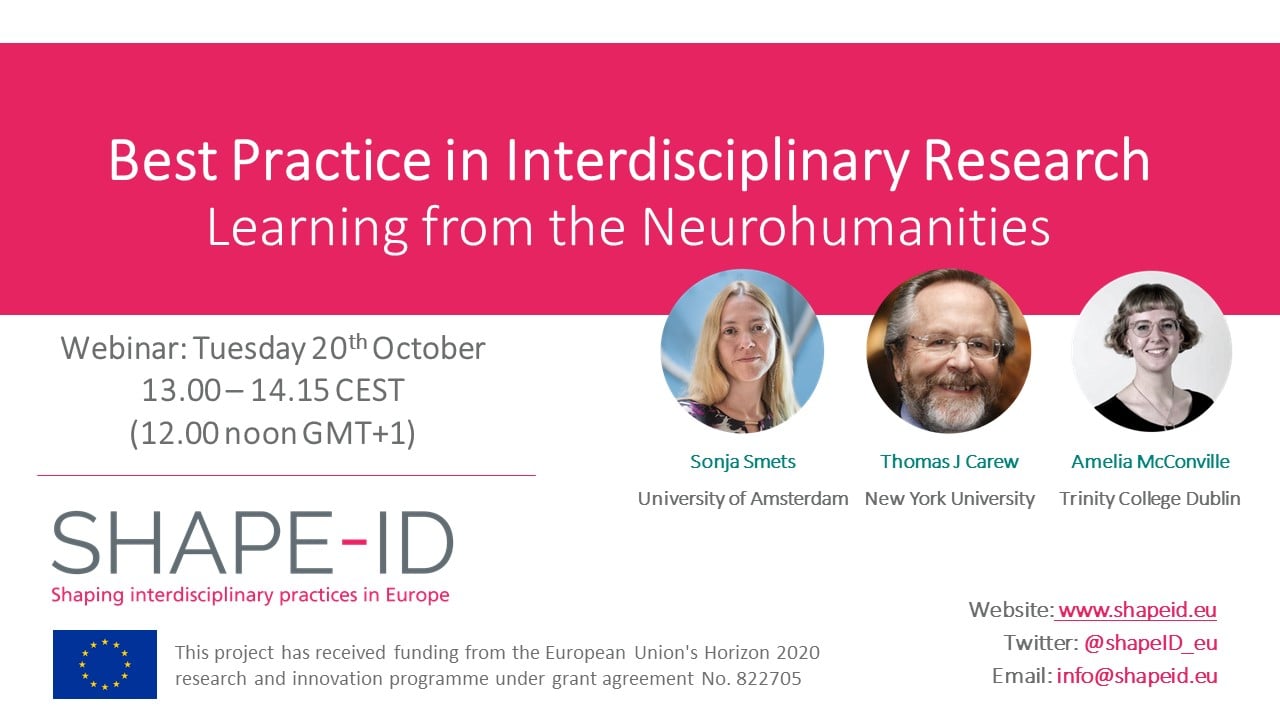Event
Best Practice in Interdisciplinary Research: Learning from the Neurohumanities / Shaping Conversations on Interdisciplinary Research (SHAPE-ID Webinar Series)
We are pleased to announce the programme for our SHAPE-ID webinar series for the coming months and we invite you to join us for some interesting discussions around interdisciplinary and transdisciplinary research involving the Arts, Humanities and Social Sciences.

Date: Tuesday 20th October 13.00 – 14.15 CEST (12.00-13.15 GMT+1)
Register: https://zoom.us/webinar/register/WN_R0-rqMfsS9KIoFM3gJDeJg
What can the experiences of researchers working in the emerging area of the Neurohumanities teach us about the challenges and potential of interdisciplinary research between the Arts and Humanities and STEM disciplines? Why engage in such research and how are researchers navigating the significant distances between their respective disciplines? This webinar will invite researchers working in the Neurohumanities to discuss best practices in interdisciplinary research from the perspective of their own experiences working at the interface of the Arts and Humanities and Neurosciences. The case studies will showcase the potential for interdisciplinary research with meaningful roles for Arts and Humanities researchers and inspire researchers to learn about and engage with interdisciplinarity. Professor Jane Ohlmeyer, Principal Investigator of the SHAPE-ID project, Director of the Trinity Long Room Hub and Chair of the Irish Research Council, will chair the discussion.
Panellists:
- Professor Sonja Smets | University of Amsterdam
- Professor Thomas J Carew | New York University
- Amelia McConville | Trinity College Dublin
Full details: https://www.shapeid.eu/webinar-20-10-20/
Please click on the headings for further details and to register:
- 20 October 2020 | Best Practice in Interdisciplinary Research: Learning from the Neurohumanities
- 10 November 2020 | Funding Interdisciplinary Research with the Arts, Humanities and Social Sciences
- 10 December 2020 | Professionalising Inter- and Transdisciplinary Expertise
Format: All webinars take place at 13.00 CET (12.00 GMT) and run for 75 minutes. Webinars will be hosted on Zoom and will take the form of short presentations from panellists followed by an interactive Q&A session with the Zoom audience. The webinars will also be live-streamed on the SHAPE-ID Facebook page.
Information
Related to the event
See also
Funding Interdisciplinary Research with the Arts, Humanities and Social Sciences / Shaping Conversations on Interdisciplinary Research (SHAPE-ID Webinar Series)
We are pleased to announce the programme for our SHAPE-ID webinar series for the coming months and we invite you to join us for some interesting discussions around interdisciplinary and transdisciplinary research involving the Arts, Humanities and Social Sciences.
Professionalising Inter- and Trandisciplinary Expertise / Shaping Conversations on Interdisciplinary Research (SHAPE-ID Webinar Series)
We are pleased to announce the programme for our SHAPE-ID webinar series for the coming months and we invite you to join us for some interesting discussions around interdisciplinary and transdisciplinary research involving the Arts, Humanities and Social Sciences.
SHAPE-ID Toolkit Launch Event and Policy Panel
We invite you to join us on 10 June 2021 for the launch of the SHAPE-ID toolkit supporting pathways to inter- and transdisciplinary research involving the Arts, Humanities and Social Sciences. The event will highlight the project’s key findings and hold a Policy Panel Discussion where experts in research funding, policy and education will discuss the practical implementation of our recommendations. We will then showcase the SHAPE-ID toolkit which offers tools and resources to help researchers, research organisations, funders, policymakers, and societal partners make informed decisions about developing and supporting inter- and transdisciplinary research.
THE 1ST BIAŁYSTOK CONFERENCE ON THEORETICAL AND APPLIED LINGUISTICS
In recent years linguistic conferences organized by the Białystok circle of neophilologists have established a strong tradition in terms of providing a forum for the exchange of views on the nature of language. It all started almost fifteen years ago, in 2002. The main aim of the conferences was to provide a meeting ground for a wide range of scholars: linguists, literary scholars, foreign language teaching methodologists, to mention but a few groups of researchers participating in the events. The conferences explored the relationship between language, culture, and social interaction. They were often organized in co-operation with French language scholars.